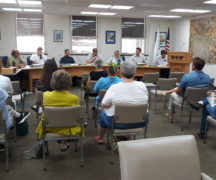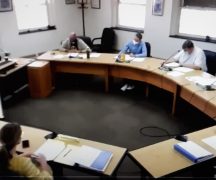By JAN LARSON McLAUGHLIN
BG Independent News
More than 10 months after the deadline for rental housing to be registered with the city of Bowling Green, nearly 30% remain unregistered.
It was one year ago that Bowling Green City Council passed a rental housing ordinance. Landlords were given until Dec. 31, 2021, to register their rental units with the city.
However, more than 2,000 of the estimated 7,200 rental units have not yet been registered, according to city Planning Director Heather Sayler. All of the major landlords in the city have complied, she said.
Over the last four decades, several city councils had made several attempts at a rental housing ordinance – with the knowledge that most other college communities in Ohio have such legislation in place to ensure safe housing for tenants. But inevitably, local efforts buckled when landlords voiced their opposition to city mandates.
When it finally passed, the legislation required the more than 7,200 rental housing units in Bowling Green to be registered with the city, have self-certification inspections by landlords, and allow the city to inspect rentals if a tenant reports that the self-inspection results are false.
There is no registration fee being charged.
Sayler believes the registration delays are due to several factors. First, the newness of the ordinance has meant many levels of education for landlords. Second, the vast number of rentals has been a lot to handle for the three-person planning office that is also juggling a city zoning code update and new historic preservation efforts. And third, properties are constantly changing hands and purposes.
“In some cases it’s obvious” that a house or complex are rentals, Sayler said. But sometimes it’s not so clear. So it means a lot of phone calls and letters, searching of utility bill data, and using fire division plans on file listing the number of units in complexes.
“We took a lot of time trying to educate people,” Sayler said. “This is a brand new program.”
In some cases, the city is unaware if a house is used by the owner or by tenants.
“Property is constantly selling. It may be a rental today, but not tomorrow,” Sayler said. That means the registry will need frequent updates. “It’s never going to be done.”
Landlords may own one rental or thousands of apartments. Either way, the city needs contact names and numbers with each unit.
“It’s so much information to collect and handle,” she said. “It’s complicated. We have to do all this background information.”
But Sayler believes the registry is good for the city.
“It’s taking us a while to get the kinks out, but hopefully it will be really useful to everyone,” she said.
To those landlords not responding, the city planning office has mailed out three notices. Information on those who still haven’t responded has been sent to the city’s legal counsel.
“We’ve tried to be as friendly as we could,” Sayler said.
The city ordinance calls for fines of up to $250 for every week a rental property goes unregistered after the deadline.
There are some exemptions, such as owner occupied housing with attached rental units, and rentals owned by religious organizations.
The ordinance also requires landlords to do self-inspections of the exteriors and interiors of their properties starting in 2023.
Copies of the completed inspection forms must be presented to the tenants and signed. Necessary epairs must be made. And if the city learns from a tenant that the inspection form was not accurate, then the city can require a third-party inspection.
An amendment to the ordinance requires city staff to study the self-inspections, and set fees if necessary, that can then be run before council.





